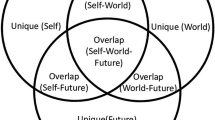Abstract
To investigate differences in cognitive coping strategies between anxiety-disordered and non-anxious 9–11-year-old children. Additionally, differences in cognitive coping between specific anxiety disorders were examined. A clinical sample of 131 anxiety-disordered children and a general population sample of 452 non-anxious children were gathered. All children filled out the child version of the Cognitive Emotion Regulation Questionnaire (CERQ-k). Structured clinical interviews were used to assess childhood anxiety disorders. Results showed that anxiety-disordered children experience significantly more ‘lifetime’ negative life events than non-anxious children. Adjusted for the ‘lifetime’ experience of negative life events, anxiety-disordered children scored significantly higher on the strategies catastrophizing and rumination, and significantly lower on the strategies positive reappraisal and refocus on planning than non-anxious children. No significant differences in cognitive coping were found between children with specific anxiety disorders. Anxiety-disordered children employ significantly more maladaptive and less adaptive cognitive coping strategies in response to negative life events than non-anxious children. The results suggest that cognitive coping is a valuable target for prevention and treatment of childhood anxiety problems.
Similar content being viewed by others
References
Allen JL, Rapee RM, Sandberg S (2008) Severe life events and chronic adversities as antecedents to anxiety in children: a matched control study. J Abnorm Child Psychol 36:1047–1056
Alyahri A, Goodman R (2008) The prevalence of DSM-IV psychiatric disorders among 7–10 year old Yemeni schoolchildren. Soc Psychiatry Psychiatr Epidemiol 43:224–230
Calkins SD, Fox NA (2002) Self-regulatory processes in early personality development: a multilevel approach to the study of childhood social withdrawal and aggression. Dev Psychopathol 14:477–498
Cartwright-Hatton S, McNicol K, Doubleday E (2006) Anxiety in a neglected population: prevalence of anxiety disorders in pre-adolescent children. Clin Psychol Rev 26:817–833
Cohen J (1988) Statistical power analysis for the behavioral sciences, 2nd edn. Erlbaum, Hillsdale, NJ
Compas BE, Connor-Smith JK, Saltzman H, Thomsen AH, Wadsworth ME (2001) Coping with stress during childhood and adolescence: problems, progress, and potential in theory and research. Psychol Bull 127:87–127
Connor-Smith JK, Compas BE (2002) Vulnerability to social stress: coping as a mediator or moderator of sociotropy and symptoms of anxiety and depression. Cogn Ther Res 26:39–55
Flavell JH (2000) Development of children’s knowledge about the mental world. Int J Behav Dev 24:15–23
Garnefski N, Kraaij V, Spinhoven P (2001) Negative life events, cognitive emotion regulation and emotional problems. Pers Individ Dif 30:1311–1327
Garnefski N, Kraaij V, van Etten M (2005) Specificity of relations between adolescents’ cognitive emotion regulation strategies and Internalizing and Externalizing psychopathology. J Adolesc 28:619–631
Garnefski N, Legerstee J, Kraaij VV, Van Den Kommer T, Teerds J (2002) Cognitive coping strategies and symptoms of depression and anxiety: a comparison between adolescents and adults. J Adolesc 25:603–611
Garnefski N, Rieffe C, Jellesma F, Terwogt MM, Kraaij V (2007) Cognitive emotion regulation strategies and emotional problems in 9–11-year-old children: the development of an instrument. Eur Child Adolesc Psychiatry 16:1–9
Gothelf D, Aharonovsky O, Horesh N, Carty T, Apter A (2004) Life events and personality factors in children and adolescents with obsessive-compulsive disorder and other anxiety disorders. Compr Psychiatry 45:192–198
Gross JJ (2007) Handbook of emotion regulation. The Guilford Press, New York
Ialongo N, Edelsohn G, Werthamer-Larsson L, Crockett L, Kellam S (1995) The significance of self-reported anxious symptoms in first grade children: prediction to anxious symptoms and adaptive functioning in fifth grade. J Child Psychol Psychiatry 36:427–437
Langley AK, Bergman RL, McCracken J, Piacentini JC (2004) Impairment in childhood anxiety disorders: preliminary examination of the child anxiety impact scale-parent version. J Child Adolesc Psychopharmacol 14:105–114
Legerstee JS, Garnefski N, Verhulst FC, Utens EMWJ (in revision) Cognitive coping in anxiety-disordered adolescents. J Adolesc
Lyneham HJ, Abbott MJ, Rapee RM (2007) Interrater reliability of the anxiety disorders interview schedule for DSM-IV: child and parent version. J Am Acad Child Adolesc Psychiatry 46:731–736
Marteinsdottir I, Svensson A, Svedberg M, Anderberg UM, von Knorring L (2007) The role of life events in social phobia. Nord J Psychiatry 61:207–212
Muris P, Mayer B, Vermeulen L, Hiemstra H (2007) Theory-of-mind, cognitive development, and children’s interpretation of anxiety-related physical symptoms. Behav Res Ther 45:2121–2132
Muris P, Meesters C, Eijkelenboom A, Vincken M (2004) The self-report version of the strengths and difficulties questionnaire: its psychometric properties in 8- to 13-year-old non-clinical children. Br J Clin Psychol 43:437–448
Ollendick TH (1983) Reliability and validity of the revised fear surgery schedule for children (FSSC-R). Behav Res Ther 21:685–692
Oosterlaan J, Prins PJM, Sergeant J (1995) Vragenlijst voor angst bij kinderen (VAK): Nederlands bewerking van de revised Fear Survey Schedule for Children [Questionnaire for fear in children: Dutch adaptation of the revised Fear Survey Schedule for Children]. Gedragstherapie 28:297–300
Saarni C (1999) The development of emotional competence. Guilford Press, New York
Siebelink BM, Treffers PDA (2001) Anxiety disorder interview schedule for DSM-IV-child version/Dutch translation. SWETS Test Publishers, Lisse, The Netherlands
Silverman WK, Albano AM (1996) Anxiety disorders interview schedule for DSM-IV child version. The Psychological Corporation, San Antonio
Silverman WK, Saavedra LM, Pina AA (2001) Test-retest reliability of anxiety symptoms and diagnoses with the anxiety disorders interview schedule for DSM-IV: child and parent versions. J Am Acad Child Adolesc Psychiatry 40:937–944
Skinner EA, Zimmer-Gembeck MJ (2007) The development of coping. Annu Rev Psychol 58:119–144
Stegge H, Meerum Terwogt M, Reijntjes A, Van Tijen N (2004) Children’s conception of the emotion process: consequences for emotion regulation. In: Nyklicek I, Temoshok L, Vingerhoets A (eds) Emotional expression and health. Routledge, Hove
Thompson RA (1991) Emotion regulation and emotional development. Educ Psychol Rev 3:269–307
Author information
Authors and Affiliations
Corresponding author
Rights and permissions
About this article
Cite this article
Legerstee, J.S., Garnefski, N., Jellesma, F.C. et al. Cognitive coping and childhood anxiety disorders. Eur Child Adolesc Psychiatry 19, 143–150 (2010). https://doi.org/10.1007/s00787-009-0051-6
Received:
Accepted:
Published:
Issue Date:
DOI: https://doi.org/10.1007/s00787-009-0051-6




